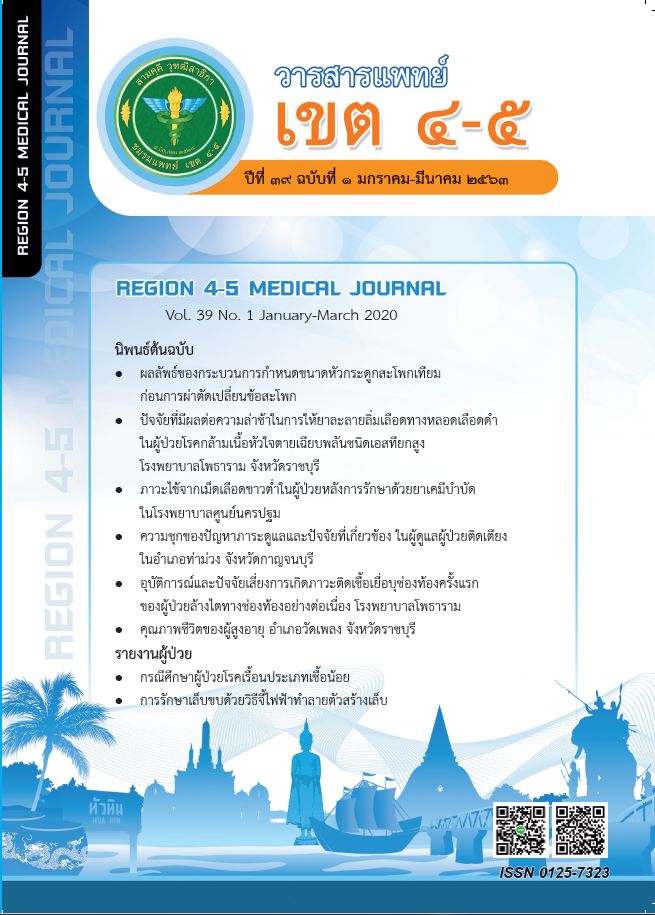ประสิทธิภาพในการทำนายอัตราการเสียชีวิตของผู้ป่วยวิกฤตที่มารับการรักษาในห้องฉุกเฉิน โรงพยาบาลสระบุรีโดยใช้ REMS (Rapid Emergency Medicine Score)
คำสำคัญ:
REMS = Rapid Emergency Medicine Score, คัดแยก, ผู้ป่วยฉุกเฉิน, อัตราการเสียชีวิตบทคัดย่อ
วัตถุประสงค์: เพื่อศึกษาประสิทธิภาพของ REMS (Rapid Emergency Medicine Score) ในการ ทำนายอัตราการเสียชีวิต ของผู้ป่วยวิกฤตที่มารับการรักษาในห้องฉุกเฉินโรงพยาบาลสระบุรี
วิธีการศึกษา: เป็นการศึกษาแบบ retrospective cohort study โดยทำการศึกษาในกลุ่มตัวอย่างเป็นผู้ป่วย วิกฤติที่มารับการรักษาในห้องฉุกเฉินโรงพยาบาลสระบุรี ซึ่งได้รับการคัดแยกด้วยระบบ R4TS เป็นระดับ วิกฤติในช่วงเดือน มีนาคม 2561 จำนวน 322 คน เพื่อศึกษาความสัมพันธ์ของ REMS กับอัตราการเสียชีวิตภายใน 30 วัน
ผลการศึกษา: จากกลุ่มตัวอย่างจำนวนทั้งสิ้น 322 คน พบว่า อัตราการเสียชีวิตเท่ากับร้อยละ 23.9 ผู้ป่วยทุกคนได้รับการรักษาในพื้นที่ช่วยกู้ชีพ เมื่อเปรียบเทียบค่า REMS ≥ 12 กับอัตราการเสียชีวิตภายใน 30 วันของผู้ป่วย พบว่ามีค่า sensitivity ร้อยละ 38 (95% CI: 24.7-52.8) specificity ร้อยละ 78.7 (95% CI: 73.3-83.4) PPV ร้อยละ 24.7 (95% CI: 15.6-35.8) NPV ร้อยละ 87.3 (95% CI: 82.5-91.2)
สรุป: ค่า REMS ≥12 เมื่อนำมาใช้กับผู้ป่วยวิกฤติที่ได้รับการคัดแยกด้วย R4TS สามารถช่วยในการทำนายอัตราการเสียชีวิตใน 30 วันได้ ควรมีการนำกระบวนการวัดสัญญาณชีพ รวมถึงตัวแปลต่าง ๆ ใน REMS ไปใช้ใน การประเมิน ผู้ป่วยที่มารับบริการที่ห้องฉุกเฉินให้เป็นการปฏิบัติการเป็นประจำ
เอกสารอ้างอิง
2. เกศินี แซ่เฮ้ง. ประสิทธิผลการคัดแยกผู้ป่วยห้องฉุกเฉินด้วยระบบ Region 4 Triage Systemโรงพยาบาลพระนั่งเกล้า. วารสารวิชาการโรงพยาบาลศูนย์/โรงพยาบาลทั่วไป เขต 4. 2018; 3: 177-85.
3. Rhee KJ, Fisher CJ, Willitis NH. The Rapid Acute Physiology Score. Am J Emerg Med. 1987;5(4):278–82.
4. Olsson T, Lind L. Comparison of the Rapid Emergency Medicine Score and APACHE II in Nonsurgical Emergency Department Patients. Acad Emerg Med. 2003;10(10):1040–8.
5. Olsson T, Terent A, Lind L. Rapid Emergency Medicine score: a new prognostic tool for in-hospital mortality in nonsurgical emergency department patients. J Intern Med. 2004;255(5):579–87.
6. Olsson T, Terent A, Lind L. Rapid Emergency Medicine Score Can Predict Long-term Mortality in Nonsurgical Emergency Department Patients. Acad Emerg Med. 2004;11(10):1008–13.
7. Kuo SH, Tsai CF, Li CR, et al. Rapid Emergency Medicine Score as a main predictor of mortality in Vibrio vulnificus–related patients. The American Journal of Emergency Medicine. 2013;31(7):1037–41.
8. Imhoff BF, Thompson NJ, Hastings MA, et al. Rapid Emergency Medicine Score (REMS) in the trauma population: a retrospective study. BMJ Open. 2014;4(5):e004738.
9. Bulut M, Cebicci H, Sigirli D, et al. The comparison of modified early warning score with rapid emergency medicine score: a prospective multicentre observational cohort study on medical and surgical patients presenting to emergency department. Emergency Medicine Journal. 2014;31(6):476–81.
10. Nakhjavan SB, Baikpour M, Yousefifard M, et al. Rapid Acute Physiology Score versus Rapid Emergency Medicine Score in Trauma Outcome Prediction; a Comparative Study. Emerg (Tehran, Iran). 2017;5(1):e30.
11. Nakhjavan SB, Yousefifard M, Faridaalaee G, et al. Performance of physiology scoring systems in prediction of in-hospital mortality of traumatic children: A prospective observational study. Journal of clinical orthopedics and trauma. 2017;8(Suppl 2):S43–8.
12. Hung SK, Ng CJ, Kuo CF, et al. Comparison of the Mortality in Emergency Department Sepsis Score, Modified Early Warning Score, Rapid Emergency Medicine Score and Rapid Acute Physiology Score for predicting the outcomes of adult splenic abscess patients in the emergency department. PLoS One. 2017;12(11):e0187495.
13. Seak CJ, Yen DH T, Ng CJ, et al. Rapid Emergency Medicine Score: A novel prognostic tool for predicting the outcomes of adult patients with hepatic portal venous gas in the emergency department. PLoS One. 2017;12(9):e0184813.
14. Alter SM, Infinger A, Swanson D, et al. Evaluating clinical care in the prehospital setting: Is Rapid Emergency Medicine Score the missing metric of EMS? Am J Emerg Med. 2017;35(2):218-21.
15. Wei X, Ma H, Liu R, et al. Comparing the effectiveness of three scoring systems in predicting adult patient outcomes in the emergency department. Medicine (Baltimore). 2019;98(5):e14289.

ดาวน์โหลด
เผยแพร่แล้ว
รูปแบบการอ้างอิง
ฉบับ
ประเภทบทความ
สัญญาอนุญาต
ลิขสิทธิ์บทความเป็นของผู้เขียนบทความ แต่หากผลงานของท่านได้รับการพิจารณาตีพิมพ์ลงวารสารแพทย์เขต 4-5 จะคงไว้ซึ่งสิทธิ์ในการตีพิมพ์ครั้งแรกด้วยเหตุที่บทความจะปรากฎในวารสารที่เข้าถึงได้ จึงอนุญาตให้นำบทความในวารสารไปใช้ประโยชน์ได้ในเชิงวิชาการโดยจำเป็นต้องมีการอ้างอิงถึงชื่อวารสารอย่างถูกต้อง แต่ไม่อนุญาตให้นำไปใช้ในเชิงพาณิชย์



